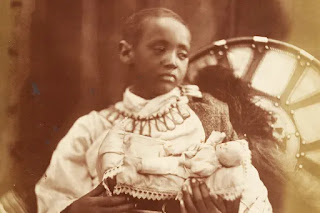Prisoner Of War?
“We want his remains back as a family and as Ethiopians because that is not the country he was born in.”- Fasil Minas, great-great-cousin.
For lovers of history this makes for a fascinating read. Many nations have gone to war over similar injustices. Just imagine the audacity of the British Royal Family. What if the script was flipped and the body of a British prince was buried in Ethiopia? Buckingham Palace has refused a repeated request to repatriate the remains of Prince Dejatch Alemayehu of Abyssinia which includes modern-day Ethiopia who was taken from his home at age 6 in 1868 and died just over a decade later in England. The body of the teenage prince captured by British troops will not be returned to his remaining family in east Africa, the British royal family has said, in the latest high-profile feud over the legacy of its vicious colonial past. This stance by the British Royal Family should not come as a surprise given that they have not yet apologized regarding their intimate role in the Transatlantic Slave Trade. Alemayehu was taken from Africa after British forces defeated his father and looted his imperial capital, in one of the most notorious military operations of Britain's colonial era. Ethiopia has been asking for the prince's remains and other treasures to be returned for the last 150 years.
Origins.
From 1855, Abyssinia had been ruled by Tewodros II (or Theodore), a Coptic Christian ruler. He had established his rule through war, defeating his rivals, but he also continued to face many internal rebellions as he tried to enforce his rule. In 1862 he had asked the British Government for an alliance and assistance in acquiring the latest weapons and tactical experts to help him, as a Christian ruler, in his wars with his mostly Muslim neighbours. However, his request went unanswered. The following year, enraged by the Foreign Office’s failure to reply, he seized a number of European hostages. Among them was the British Consul, Captain Charles Cameron, who was kept in chains for over two years. However, initial diplomatic negotiations and numerous gifts failed to secure their release. By June 1867, in the face of mounting public indignation, the British reluctantly concluded that military intervention was necessary. According to the National Army Museum in London, in December 1867, Britain launched an expedition of 13,000 soldiers and 40,000 animals, including 44 elephants trained to pull huge artillery guns to free the hostages.
Request Denied.
Prince Alemayehu's body is buried at Windsor Castle, one of King Charles III's official residences and the traditional site of British royal funerals and weddings. The family of the prince has made repeated requests for his remains to be returned, however, Buckingham Palace said that this was not possible as it would disturb other human remains buried nearby. The palace added, "The Dean and Canons of Windsor are very sensitive to the need to honour the memory of Prince Alemayehu. However, this statement falls short of what is required; especially given that a new British monarch King Charles 111 is now in charge of the royal family. This decision by the royal family is rooted in a colonial era arrogance and has no place in a modern world. The young prince was only 6 years old when he was captured and taken to the United Kingdom. Prince Dejatch Alemayehu was heir to the throne of Abyssinia now known as Ethiopia. Alemayehu was brought to the United Kingdom by British forces. His mother, who was traveling with him, died en route, leaving him an orphan when he arrived on British shores. He had no family in this foreign country and died there. The prince had nothing to do with the Battle of Magdala which occurred with his father and colonial Britain. Alemayehu died at 18 from pleurisy, a lung condition and was buried at St. George’s Chapel in Windsor. His epitaph reads: “I was a stranger and ye took me in.” The government of Ethiopia should continue and explore all avenues to have the body of the prince returned home. Perhaps it is time to seek the assistance of the United Nations in order to correct this injustice which has been dealt to the people of Ethiopia. Under the Geneva Convention any unlawful act or omission by the Detaining Power causing death or seriously endangering the health of a prisoner of war in its custody is prohibited, and will be regarded as a serious breach of the present Convention. King Charles 111 should seize this moment in history and do what is right and moral. It is unacceptable the level of disdain and disrespect that the British royal family continue to show towards the family of Prince Alemayehu. Additionally, the British government should also return the looted items from Magdala, which are of great historical, cultural and religious significance to Ethiopians. For many historians, Prince Alemayehu was a prisoner of war.
“We believe Prince Alemayehu deserves a descent burial in his home country.”- Ethiopian Government.
Wayne Campbell is an educator and social commentator with an interest in development policies as they affect culture and or gender issues.
waykam@yahoo.com
@WayneCamo
©
#BattleofMagdala #PrinceAlemayehu #Ethiopia





Comments
Post a Comment